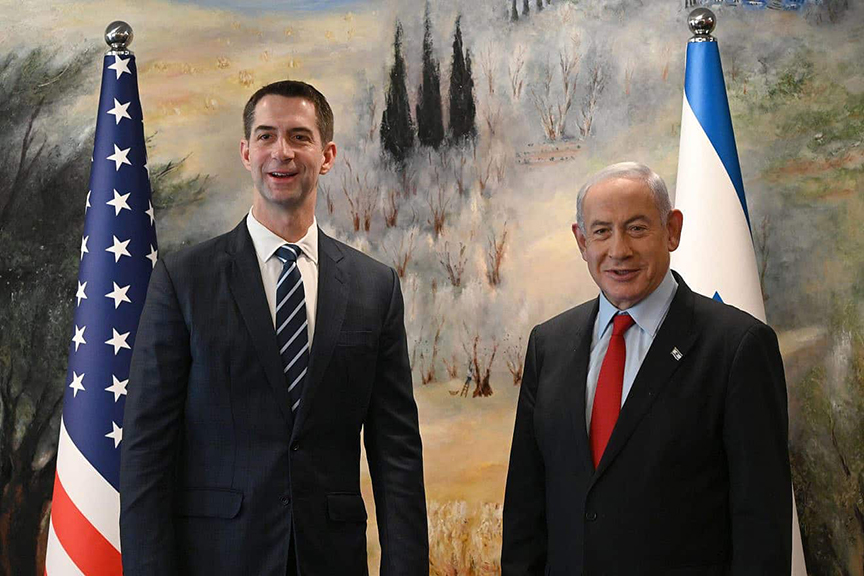In the Middle East, we can’t trust the CIA’s judgment

by Mitchell Bard
(JNS) — Most people probably remember Jack Nicholson’s iconic line in the film “A Few Good Men”: “You can’t handle the truth!” After reading that CIA director William Burns said the agency “doesn’t see any evidence that Iran’s Supreme Leader has made a decision to move to weaponize,” I thought of another line from the movie, when Tom Cruise says to Demi Moore, “Thank you for playing ‘follow the advice of the galactically stupid’.” In the movie, her advice worked out, but that’s a Hollywood ending; the story with Iran is not likely to turn out as well.
On one level, Burns’ statement was astonishing, but given the CIA’s long record of incompetence in Middle East assessments, it shouldn’t be. After all, the intelligence community told President Joe Biden the Taliban would not immediately take over the country when our troops pulled out. Anyone with eyes in their head and a passing knowledge of Afghanistan could have predicted what did happen.
I could cite example after example from the failure to anticipate the Iranian revolution and the Arab spring to faulty assessments of almost every aspect of the Arab-Israeli conflict going back to the beginning when the CIA published a report on the consequences of the partition of Palestine. The CIA predicted that Arab governments would not declare war (five sent armies to invade Israel); that the Arabs would have a force of 100,000 to 200,000 fighters and the Zionists 200,000 (both had about 30,000 when the war began); and that without substantial aid in manpower and materiel, Israel could hold out no longer than two years (the Arabs, not the Jews, received substantial aid, and Israel won the war in 15 months).
The only U.S. government body that has been as consistently wrong as the CIA is the U.S. State Department. Guess where Burns spent 33 years of his career?
The CIA’s failures have been due in part to inept analysis driven for years by Arabists whose views mirrored those of their fellow travelers in the foreign service. The CIA has also been notoriously short of assets in the region. Thus, it was not surprising to learn it was Israeli intelligence that warned the United States in October that one of its bases was going to be attacked by Iranian suicide drones, allowing troops to be evacuated before the strike. This was also an example of Israel saving American lives, which contradicts the Arabist narrative that Israel endangers U.S. forces.
When it comes to Iran, the CIA was unaware of the Iranian nuclear project for years, just as it was unaware of the Iraqi and Syrian efforts to build a bomb. The CIA also was oblivious as Iran preserved and expanded its nuclear know-how for future use after former President Barack Obama signed a nuclear deal with Iran in 2015 — the Joint Comprehensive Plan of Action. They only learned about Iran’s activities when they received documents obtained by the Mossad.
Former deputy national security adviser Victoria Coates said during a Mosaic podcast: “After the revelation of the Iranian nuclear archive by the Israelis in 2018, we know they have had at least the intent to gain the capability to design a nuclear weapon, and that they went to a great deal of trouble to preserve that capability, and they didn’t give it up during the 2015 negotiations. They kept it secret.”
David Albright, a former weapons inspector, said the archive discovered by Israel indicated Iran knew more about making nuclear weapons and could make them quicker; that Iran had almost two-dozen sites related to its nuclear-weapons program and that the International Atomic Energy Agency had visited only three; that Iran had designed its own weapon; that Iran can or is close to having the capability to arm a medium-range missile with a nuclear warhead; and that it continued its program after the signing the JCPOA.
Israeli intelligence later discovered a warehouse in Tehran used to store nuclear equipment and material, and called on the IAEA to investigate. The Iranians claimed the warehouse was a carpet factory. The CIA apparently had no knowledge of the storage place which the IAEA subsequently found had trace amounts of radioactive material.
In December 2019, France, Germany and the United Kingdom — not the United States — urged U.N. Secretary-General António Guterres to inform the Security Council that “Iran’s developments of nuclear-capable ballistic missiles” violates Resolution 2231, urging Iran “not to undertake any activity related to ballistic missiles designed to be capable of delivering nuclear weapons.”
Iran continues to ignore the resolution with impunity. Last January, the country tested missiles capable of carrying a 1,400-pound warhead approximately 1,200 miles (the distance to Israel is roughly 1,100 miles). Iran can thank Obama for omitting missile development from the JCPOA. Iran now says it will not agree to any restrictions on its missile research in a new deal.
Don’t forget that Iran has not withdrawn from the JCPOA nor have the other signatories, so it is still obligated to comply with its terms. Instead, Iran has brazenly violated them without suffering any consequences. (Where are the “snapback sanctions” Obama promised?) It is also well-documented that Iran was violating the JCPOA from day one, despite claims by the agreement’s supporters that it was always in compliance.
Other intelligence services, notably in Germany, have repeatedly reported that Iran has engaged in efforts to seek weapons of mass destruction. In June 2018, for example, Baden-Württemberg intelligence reported: “Iran continued to undertake, as did Pakistan and Syria, efforts to obtain goods and know-how to be used for the development of weapons of mass destruction and to optimize corresponding missile-delivery systems.”
That same year, the United States and the United Arab Emirates separately reported instances of the export to Iran of “dual-use items” that have a potential nuclear purpose. The U.S.-reported shipment included carbon fiber, a material that can be used in missile nose cones as well as some types of enrichment centrifuges. In July 2019, three Iranians were charged in New York with trying to illegally export “many tons” of carbon fiber.
After Iran announced plans to increase uranium enrichment levels to 60 percent in April, Germany, France and Britain issued a joint statement that said: “This is a serious development since the production of highly enriched uranium constitutes an important step in the production of a nuclear weapon.” The trio said this enriched uranium had no “credible” civilian use.
Rafael Grossi, director-general of the IAEA agreed, saying “a country enriching at 60 percent is a very serious thing — only countries making bombs are reaching this level.”
On the eve of resuming negotiations, Iranian officials admitted plans to build offensive atomic weapons and planned to announce they have the ability and knowledge to make a bomb. A week before the talks, Gen. Kenneth McKenzie, commander of U.S. Central Command, assessed Iran’s progress. “They’re very close this time,” he said. “I think they like the idea of being able to breakout.”
Israel reportedly shared intelligence with the United States that Iran is preparing to enrich uranium to 90 percent — the level needed to produce a bomb. According to the Institute for Science and International Security, Iran already has enough enriched uranium to produce a nuclear weapon in three weeks.
Iran has been engaged in activities that have no peaceful purpose, and there is incontrovertible public evidence that it is moving towards building a bomb, so how can Burns say with a straight face that Iran hasn’t decided to build a nuclear weapon?
Perhaps it is part of a strategy to convince Americans that it is not too late to negotiate a deal to prevent Iran from building a bomb. Accepting this would require willful blindness. We were promised by Obama that all avenues to a bomb were cut off by the JCPOA and yet the Iranians may be within weeks of having enough fissile material for one nuclear bomb. Furthermore, the Iranians have categorically said they won’t go back to the old deal, let alone accept the “longer and stronger” deal that Biden promised despite the sanctions relief the administration is desperately offering.
“You cannot put the genie back into the bottle — once you know how to do stuff, you know, and the only way to check this is through verification… The Iranian program has grown, become more sophisticated so the linear return to 2015 is no longer possible,” said Grossi.
Of course, we learned from the last six years the IAEA can’t verify what Iran is doing.
It’s long past time for Biden to stop taking “galactically stupid” advice and acknowledge that Iran will not be dissuaded from building a bomb and, in his words, “turn to other options.”
Mitchell Bard is a foreign-policy analyst and an authority on U.S.-Israel relations who has written and edited 22 books, including “The Arab Lobby, Death to the Infidels: Radical Islam’s War Against the Jews” and “After Anatevka: Tevye in Palestine.”



